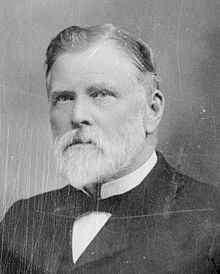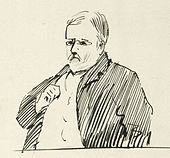John Duthie (politician)
John Duthie | |
|---|---|
 Portrait of John Duthie in ca 1900 | |
| New Zealand Legislative Council | |
| In office 25 June 1913 – 14 October 1915 | |
| Member of the New Zealand Parliament for City of Wellington | |
| In office 5 December 1890 – 14 November 1896 | |
| In office 9 March 1898 – 15 November 1899 | |
| In office 25 November 1902 – 15 November 1905 | |
| 9th Mayor of Wellington | |
| In office 1889–1890 | |
| Personal details | |
| Born | 28 February 1841 Kintore, Aberdeenshire, Scotland |
| Died | 14 October 1915 (aged 74) |
| Occupation | businessman; politician |
John Duthie (28 February 1841 – 14 October 1915) was a politician and businessman in New Zealand. Originally from Scotland, he came to Auckland in 1863. He set up his own ironmongery in New Plymouth, then Wanganui, and he finally settled in Wellington. In the latter city, he was mayor for one term. He then represented Wellington in Parliament for a total of eleven years. For the last two years of his life, he was appointed to the New Zealand Legislative Council.
Early life
Duthie was born on 28 February 1841[1] in Kintore, Aberdeenshire, Scotland. He was educated at the Aberdeen Grammar School. In that city, he undertook an apprenticeship with Glegg and Thompson, an ironmongery. After his training, Duthie was for some years travelling in Scotland and Ireland for a Sheffield firm.[2]
Professional life in New Zealand


Duthie arrived in Auckland, New Zealand, on 16 November 1863 on the Helvellyn.[2][3] For some time he acted as traveller for Cruickshank, Smart and Co., ironmongers. About 1866 Dutbie moved to New Plymouth and started in business; about two years later extending the operations to Wanganui, where he opened a branch and conducted a growing trade for many years.[2] He was for many years in partnership with Charles Brown in New Plymouth.[4] In 1879 he came to Wellington, and started the business that developed into John Duthie and Co. Limited. Until 1887 or 1888, Duthie retained an interest in the Wanganui business, which he then sold to his partner, James Thain.[2]
He was the director of several city companies, and was in business with James Gear[5] in the 1880s, where he was a director, and for two years served as the chairman of directors.[2] He was at one time president of the Wellington Chamber of Commerce, and was president of the Caledonian Society for some years.[2] Duthie was one of the founding directors of The Dominion newspaper and was chairman of the newspaper's board from 1912 until his death in 1915.[6] That newspaper merged in 2002 with the other Wellington daily, The Evening Post, to form the Dominion Post.
Political career
| Years | Term | Electorate | Party | ||
|---|---|---|---|---|---|
| 1890–1893 | 11th | City of Wellington | Independent | ||
| 1893–1896 | 12th | City of Wellington | Independent | ||
| 1898–1899 | 13th | City of Wellington | Independent | ||
| 1902–1905 | 15th | City of Wellington | Independent | ||
While a resident of Wanganui, he was at one time chairman of the Harbour Board. In Wellington he was a member of the Wellington Harbour Board for many years and was chairman of that body in 1887–1888. In 1889, he was elected Mayor of Wellington without opposition. He held the position for one year.[2]

Duthie, a conservative politician who was never sympathetic to the ideas of the Liberal Party,[7] was first elected to the three-member electorate of City of Wellington in the 1890 general election, when he came second, with 50 votes behind George Fisher, but 300 votes ahead of Kennedy Macdonald.[2] He served until the end of the term of the 11th New Zealand Parliament in 1893.[8] At the 1893 general election, he was again elected for Wellington, coming third alongside Francis Bell (the later Prime Minister) and Robert Stout (the former Prime Minister), but defeating the incumbent Macdonald.[2][9] Duthie retired at the end of the term of the 12th New Zealand Parliament in 1896 and did not stand in the 1896 general election.[8][10]
The resignation of Stout triggered the 9 March 1898 City of Wellington by-election. The election was contested by Duthie and Richard Clement Kirk, with the former being successful.[11][12] Duthie retired at the end of the term of the 13th New Zealand Parliament in 1899 and did not stand in the 1899 general election.[8][13]
Duthie stood once more in the three-member Wellington electorate in the 1902 general election and came second, and was thus returned alongside John Aitken and George Fisher.[14] He served until the end of the term of the 15th New Zealand Parliament in 1905.[8]
The Wellington electorate was abolished in 1905 and replaced by three single-member electorates. Duthie chose to contest the Wellington North electorate and contested it against Charles Hayward Izard and George Dickson Macfarlane.[15] Izard was successful, with Duthie coming second, and the latter's parliamentary career had thus come to an end.[16]
Duthie was remembered as one of the sternest critics of the Liberal Government under Richard Seddon. Duthie had a very direct manner. He believed strongly that he was right, and that everybody who disagreed with him was wrong.[7]
Under William Massey's Reform Government, Duthie was appointed to the Legislative Council on 26 June 1913 and served until his death.[7][8]
Balgownie House
The Duthie family lived in Wellington until their new home, Balgownie, was completed in 1903 in the Lower Hutt suburb of Naenae. The house, built entirely from native timbers, was at the time regarded as one of the finest in the Wellington region. It had its own electricity generation plant on the property and is believed to be the first house in the region that had electricity. The house is these days a private residence.[6]
Both the house and the generator building are registered with Heritage New Zealand as Category II heritage structures. The house is registered under number 4140,[6] and the generator building under number 4141.[17]
Family and death
Duthie married Mary Anne Duthie (née Mercer, born 3 December 1840).[1]
Three of their daughters died young: Laura (1 September 1875 – 30 March 1876) was buried at Wanganui, while Isabella Miller (15 March 1867 – 12 November 1896; wife of Thomas Miller[18]) and Florence (27 January 1876 – 21 December 1896) were both buried at Karori Cemetery.[1][19][20]
His wife died on 8 October 1911 and is buried at Karori Cemetery.[1][21] Duthie died on 14 October 1915 at his residence Balgownie aged 74 years.[22] He was buried at Karori Cemetery in plot number 85 F two days later, next to his wife.[23][24] He was survived by one daughter and six sons.[7]
Mercer Street in central Wellington is named in honour of the mayoress.[25] Duthie Street in Karori is named for him, although he never lived in Karori.[26]
References
 This article incorporates text from a publication now in the public domain: Cyclopedia Company Limited (1897). The Cyclopedia of New Zealand : Wellington Provincial District. Wellington: The Cyclopedia of New Zealand. Retrieved 27 August 2011.
This article incorporates text from a publication now in the public domain: Cyclopedia Company Limited (1897). The Cyclopedia of New Zealand : Wellington Provincial District. Wellington: The Cyclopedia of New Zealand. Retrieved 27 August 2011.
- ^ a b c d "Karori Cemetery (transcription of headstones))". New Zealand Society of Genealogists. Retrieved 27 August 2011.
- ^ a b c d e f g h i Cyclopedia Company Limited (1897). The Cyclopedia of New Zealand : Wellington Provincial District. Wellington: The Cyclopedia of New Zealand. Retrieved 27 August 2011.
- ^ "Shipping Intelligence. Port of Auckland". Daily Southern Cross. Vol. XIX, no. 1977. 17 November 1863. p. 2. Retrieved 27 August 2011.
- ^ A. H. McLintock, ed. (22 April 2009) [1966]. "BROWN, Charles". An Encyclopaedia of New Zealand. Ministry for Culture and Heritage / Te Manatū Taonga. Retrieved 20 August 2011.
- ^ Hawke, G. R. "Gear, James - Biography". Dictionary of New Zealand Biography. Ministry for Culture and Heritage. Retrieved 27 August 2011.
- ^ a b c "Balgownie". New Zealand Heritage List/Rārangi Kōrero. Heritage New Zealand. Retrieved 29 August 2011.
- ^ a b c d "Obituary". Evening Post. Vol. XC. 14 October 1915. p. 8. Retrieved 27 August 2011.
- ^ a b c d e Scholefield, Guy (1950) [First ed. published 1913]. New Zealand Parliamentary Record, 1840–1949 (3rd ed.). Wellington: Govt. Printer. pp. 76, 104.
- ^ "Page 6 Advertisements Column 2". Evening Post. Vol. LII, no. 161. 28 November 1896. p. 6. Retrieved 26 August 2011.
- ^ "Declaration of the Wellington Poll". Nelson Evening Mail. Vol. XXX, no. 292. 10 December 1896. p. 2. Retrieved 26 August 2011.
- ^ "Page 6 Advertisements Column 4". Evening Post. Vol. LV, no. 52. 3 March 1898. p. 6. Retrieved 26 August 2011.
- ^ "Wellington Election". Feilding Star. Vol. XIX, no. 214. 10 March 1898. p. 2. Retrieved 26 August 2011.
- ^ "Political Notes". Taranaki Herald. Vol. XLVIII, no. 11698. 13 December 1899. p. 3. Retrieved 26 August 2011.
- ^ "Page 24 Advertisements Column 2". New Zealand Free Lance. Vol. III, no. 127. 6 December 1902. p. 24. Retrieved 26 August 2011.
- ^ "Page 7 Advertisements Column 5". Evening Post. Vol. LXX, no. 136. 6 December 1905. p. 7. Retrieved 26 August 2011.
- ^ "Declaration of the Poll in Wellington". Wairarapa Daily Times. Vol. XXIX, no. 8317. 7 December 1905. p. 5. Retrieved 26 August 2011.
- ^ "Balgownie Generator Building". New Zealand Heritage List/Rārangi Kōrero. Heritage New Zealand. Retrieved 29 August 2011.
- ^ "Tuesday, April 28, 1891". Wanganui Herald. Vol. XXV, no. 7399. 28 April 1891. p. 2. Retrieved 27 August 2011.
- ^ "Details". Wellington City Council. Retrieved 28 August 2011.
- ^ "Details". Wellington City Council. Retrieved 28 August 2011.
- ^ "Details". Wellington City Council. Retrieved 28 August 2011.
- ^ "Deaths". Evening Post. Vol. XC. 14 October 1915. p. 1. Retrieved 27 August 2011.
- ^ "Late Mr. John Duthie". Evening Post. Vol. XC, no. 92. 16 October 1915. p. 6. Retrieved 27 August 2011.
- ^ "Details". Wellington City Council. Retrieved 27 August 2011.
- ^ "Old Shoreline Heritage Trail" (PDF). Wellington City Council. p. 26. Retrieved 27 August 2011.
- ^ No Mean City by Stuart Perry (1969, Wellington City Council)
- Use dmy dates from November 2012
- 1841 births
- 1915 deaths
- Mayors of Wellington
- Members of the New Zealand House of Representatives
- Members of the New Zealand Legislative Council
- Scottish emigrants to New Zealand
- New Zealand MPs for Wellington electorates
- Burials at Karori Cemetery
- Unsuccessful candidates in the New Zealand general election, 1905
- Wellington Harbour Board members
- 19th-century New Zealand politicians
